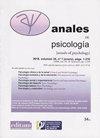西班牙语版成人元认知自我评估量表(MSAS)
IF 1.3
4区 心理学
Q3 PSYCHOLOGY
引用次数: 0
摘要
背景:虽然在西班牙语中也有其他评估元认知的工具,但没有其他工具像元认知自我评估量表(MSAS)那样快速、简单和多维。目的:调整和验证MSAS为西班牙语。方法:973名志愿者,女性68.3%,平均年龄27.9岁(SD = 12.68)。结果:西班牙语适应的内部一致性总体较好,总α = .830,各因子的内部一致性α = .658 ~ .826。原始的四因素结构(自我反思、临界距离、精通和理解他人心理)显示出足够的拟合指数。并发效度指标的证据并不如预期的那样。判别效度的指标是有精神病理史(d = 0.222)或心理治疗(d = 0.326)的参与者自我反思得分较低;心理治疗组(d = .345)、药物治疗组(d = .482)、药物治疗临界距离组(d = .419)。结论:西班牙语对MSAS的适应和验证似乎足以评估普通人群的元认知及其子成分,为临床和研究应用开辟了广阔的领域。先行词:unque existen otras herramientas en español para evaluar la metacognición, no hay una versión disposable desde una perspectiva多维como la Escala de Autoevaluación de la Metacognición(元认知自我评估量表,MSAS), que tiene además la ventaja de ser senciilla y rápida en su aplicación。目的:应用自适应方法研究黄芪多糖的有效性español。3 .参加:975名志愿者/as, 68.2%妇女,媒体27.9 años (DT = 12.68)。结果:Los valores psicomsamtricos de la adaptación al español son adecuados, α = .830 (total), y中心α = .658 y .826 (factors)。结构因子原因子de cuatro因子(autoreflexilexiad, distance Crítica, Maestría y Comprensión de Mentes Ajenas),结构因子de adecuados índices de ajuste。在禁运期间,标准的有效性指数不低于标准的有效性指数。4个指标验证了被试者的鉴别性判断是否有效,包括前因因素psicopatológicos (d = 0.222)、治疗因素psicológico (d = 0.326)和自反射因素;el因子Dominio entre los que establan bajo tratamiento psicológico (d = .345); tenían prescriita medicación (d = .482); el因子distance crítica para los participantes con medicación (d = .419)。结论:y validacion de La La adaptacion MSAS西班牙语版对位poblacion一般parece adecuada对位evaluar La metacognicion y sus子组件,abriendo联合国amplio campo de aplicaciones太多丹尼科莫德investigacion。本文章由计算机程序翻译,如有差异,请以英文原文为准。
Spanish version of the Metacognition Self-Assessment Scale (MSAS) for adults
Background: Although there are other tools in the Spanish language for assessing metacognition, there is no other that is as quick, simple and multidimensional as the Metacognition Self-Assessment Scale (MSAS). Objectives: Adapt and validate the MSAS to Spanish. Method: The sample consisted of 973 volunteers, 68.3% women and mean age of 27.9 years (SD = 12.68). Results: The internal consistency of the Spanish adaptation was generally adequate with a total α = .830, and from α = .658 to .826 for the factors. The original four-factor structure (Self-Reflexivity, Critical Distance, Mastery and Understanding Other Minds) showed adequate fit indices. The evidence of concurrent criterion validity indices was not as expected. Indications of discriminant validity were the low Self-Reflexivity scores of participants with a psychopathological history (d = .222) or psychological treatment (d = .326); in Mastery by those under psychological treatment (d = .345) or medication (d = .482), and in Critical distance for medication (d = .419). Conclusion: The Spanish adaptation and validation of the MSAS seems adequate for assessing metacognition and its subcomponents in the general population, opening a wide field of clinical and research applications.
Antecedentes: Aunque existen otras herramientas en español para evaluar la metacognición, no hay una versión disponible desde una perspectiva multidimensional como la Escala de Autoevaluación de la Metacognición (Metacognition Self-Assessment Scale, MSAS), que tiene además la ventaja de ser sencilla y rápida en su aplicación. Objetivos: Adaptar y validar la escala MSAS al español. Método: Participaron 975 voluntarios/as, 68.2% mujeres, edad media de 27.9 años (DT = 12.68). Resultados: Los valores psicométricos de la adaptación al español son adecuados, α = .830 (total), y entre α = .658 y .826 (factores). La estructura factorial original de cuatro factores (Autorreflexividad, Distancia Crítica, Maestría y Comprensión de Mentes Ajenas) muestra adecuados índices de ajuste. Sin embargo, los indicios de validez de criterio no han sido los esperados. Los indicadores de validez discriminante fueron bajos en los participantes con antecedentes psicopatológicos (d = .222) y tratamiento psicológico (d = .326) en el factor Autorreflexividad; en el factor Dominio entre los que estaban bajo tratamiento psicológico (d = .345) y tenían prescrita medicación (d = .482), y en el factor Distancia crítica para los participantes con medicación (d = .419). Conclusión: La adaptación y validación de la MSAS en español para población general parece adecuada para evaluar la metacognición y sus subcomponentes, abriendo un amplio campo de aplicaciones tanto clínicas como de investigación.
求助全文
通过发布文献求助,成功后即可免费获取论文全文。
去求助
来源期刊

Anales De Psicologia
医学-心理学
CiteScore
3.30
自引率
5.90%
发文量
57
审稿时长
4-8 weeks
期刊介绍:
Anales de Psicologia / Annals of Psychology is a multidisciplinary journal of the various thematic areas of scientific psychology. It publishes original research articles and theoretical review in any of its basic, applied and methodological areas included within psychology.
Publishing, financing, marketing and distribution corresponds Editum: Editions of the University of Murcia (Spain). The organizational guidelines and editorial policies come from the Editorial Team (elected for four years by the Areas and / or Departments of Psychology at the University of Murcia) and the Editorial Board, composed of scholars and experts from different universities and institutions national and international. It is published in print (ISSN: 0212-9728) since 1984 and in Internet publishing (web) (ISSN: 1695-2294) since 2000. Available online full text in pdf from the vol. 1 1984.
Anales de Psicologia / Annals of Psychology maintains a system of exchange with other journals and publications of psychology in the world. Through an free exchange agreement with their respective publishers or entities responsible for editing, these journals and publications are received at the University of Murcia (Biblioteca "Luis Vives", near the Faculty of Psychology) and in return, our journal is sent to libraries and educational and research institutions such centers responsible for editing.
 求助内容:
求助内容: 应助结果提醒方式:
应助结果提醒方式:


